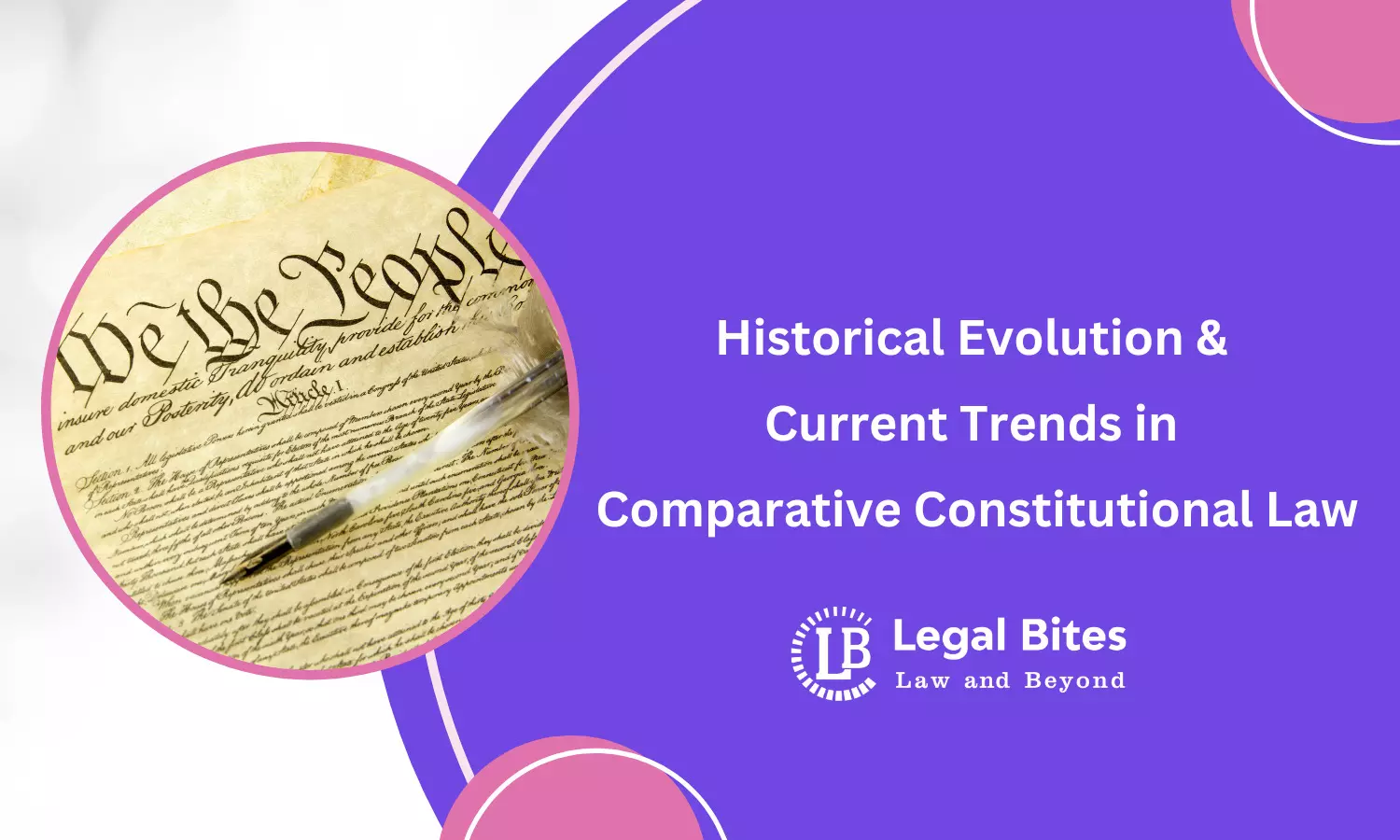Historical Evolution and Current Trends in Comparative Constitutional Law
This article delves into the historical evolution, contemporary trends, and methodological challenges in comparative constitutional law.

Comparative constitutional law has emerged as a dynamic and influential field within legal studies. Its evolution reflects the growing interdependence of nations, driven by globalization, transnational governance, and technological advancements. Once a niche subject, it is now a core area of academic inquiry and judicial practice, particularly in understanding constitutional rights and governance mechanisms across diverse legal systems. Historical Evolution of Comparative...
Comparative constitutional law has emerged as a dynamic and influential field within legal studies. Its evolution reflects the growing interdependence of nations, driven by globalization, transnational governance, and technological advancements. Once a niche subject, it is now a core area of academic inquiry and judicial practice, particularly in understanding constitutional rights and governance mechanisms across diverse legal systems.
Historical Evolution of Comparative Constitutional Law
Early Beginnings
The roots of comparative constitutional law can be traced to the 18th and 19th centuries, a period marked by the drafting of foundational documents such as the United States Constitution (1787) and the French Constitution (1791). These early experiments in constitutionalism inspired emulation and adaptation in Europe and Latin America. Scholars like Montesquieu advocated for the comparative study of governance structures to understand the principles of separation of powers and checks and balances.
Post-World War II Renaissance
The mid-20th century witnessed a constitutional renaissance following the devastation of World War II. The adoption of constitutions in Germany (1949), Japan (1947), and Italy (1948) exemplified the commitment to democratic governance, human rights, and the rule of law. This period also saw the establishment of constitutional courts, such as Germany's Federal Constitutional Court, which became pivotal in interpreting and enforcing constitutional principles.
Decolonization and Democratization
The wave of decolonization in Africa, Asia, and the Caribbean further expanded the scope of comparative constitutional law. Newly independent nations adopted constitutions reflecting a blend of indigenous values and Western legal traditions. For instance, India’s Constitution (1950) integrated British parliamentary practices with American federalism and fundamental rights, establishing a hybrid model.
Late 20th Century: Globalization of Constitutional Ideas
The late 20th century marked the globalization of constitutional principles, characterized by:
The End of the Cold War: Countries in Eastern Europe transitioned from authoritarian regimes to democracies, adopting new constitutions to reflect their aspirations.
Rise of Supranationalism: Entities like the European Union (EU) and courts such as the European Court of Human Rights (ECHR) began shaping national constitutional norms.
Judicial Activism: Courts worldwide, from South Africa to India, emerged as proactive interpreters of constitutional rights.
Current Trends in Comparative Constitutional Law
In recent years, comparative constitutional law has experienced significant transformations, reflecting broader global shifts.
Constitutional Borrowing and Transplants
Countries continue to draw inspiration from foreign constitutional models. For instance, South Africa's post-apartheid constitution incorporated elements from the U.S. Bill of Rights and the German Basic Law. This practice, known as constitutional borrowing, facilitates the adoption of tested frameworks to address local challenges.
Judicial Dialogue and Transnational Influence
Courts increasingly reference foreign judgments and international norms in their rulings. This judicial dialogue fosters a transnational legal discourse, promoting the harmonization of constitutional principles across borders. For example, the Indian Supreme Court has cited U.S. and U.K. precedents in its interpretations of fundamental rights.
Rise of Populism and Constitutional Backsliding
The global rise of populism has led to challenges in constitutional democracies. Some governments have attempted to undermine judicial independence and erode checks and balances, leading to what scholars term "constitutional backsliding." This trend has prompted comparative constitutionalists to study the resilience of constitutional frameworks in the face of such pressures.
Emphasis on Socio-Economic Rights
There is a growing recognition of socio-economic rights, such as the right to education, health, and housing, within constitutional frameworks. Countries like South Africa and India have been at the forefront of this movement, with their courts actively enforcing these rights. Comparative studies examine how different jurisdictions implement and protect socio-economic rights, offering lessons for other nations.
Digital Age and Constitutional Adaptations
The digital revolution has introduced new challenges, including data privacy, cyber security, and the regulation of digital platforms. Constitutions, traditionally designed for the analogue age, are being reinterpreted or amended to address these issues. Comparative analyses explore how various countries adapt their constitutional frameworks to the realities of the digital era.
Challenges in Comparative Constitutional Law
Despite its advancements, the field faces several challenges:
Contextual Differences: Legal systems are deeply rooted in their unique historical, cultural, and social contexts. Comparative analyses must account for these differences to avoid superficial or misleading conclusions.
Methodological Concerns: Determining appropriate criteria for comparison and ensuring objective analysis remain ongoing debates within the discipline. Scholars strive to develop robust methodologies that balance depth with breadth.
Dynamic Nature of Constitutions: Constitutions are living documents that evolve over-time. Comparative studies must consider not only the textual provisions but also the interpretative practices and real-world applications within each jurisdiction.
Conclusion
Comparative constitutional law offers invaluable insights into the diverse ways nations structure their governance and protect fundamental rights. By examining both historical evolutions and current trends, scholars and practitioners can better understand the complexities of constitutional design and interpretation. As the world continues to face new challenges, from populism to technological advancements, the field of comparative constitutional law will remain essential in navigating the evolving landscape of global governance.
References
[1] Comparative Matters: The Renaissance of Comparative Constitutional Law, Available Here
[2] Current trends and challenges in comparative constitutional law: In search of a new equilibrium, Available Here
[3] Hirschl, Ran, The Rise of Comparative Constitutional Law: Thoughts on Substance and Method, Available Here
[4] Is a Science of Comparative Constitutionalism Possible?, Available Here

Apurva Neel
I am a Research Associate and Editor at Legal Bites with an LL.M. specialization in Corporate and Commercial Laws from Amity University, Mumbai. I have put my best efforts into presenting socio-legal aspects of society through various seminars, conferences etc. I keep refining content as I am an ardent writer, and palpably law has got multi-dimensional aspect, so I passionately try to explore ahead.

